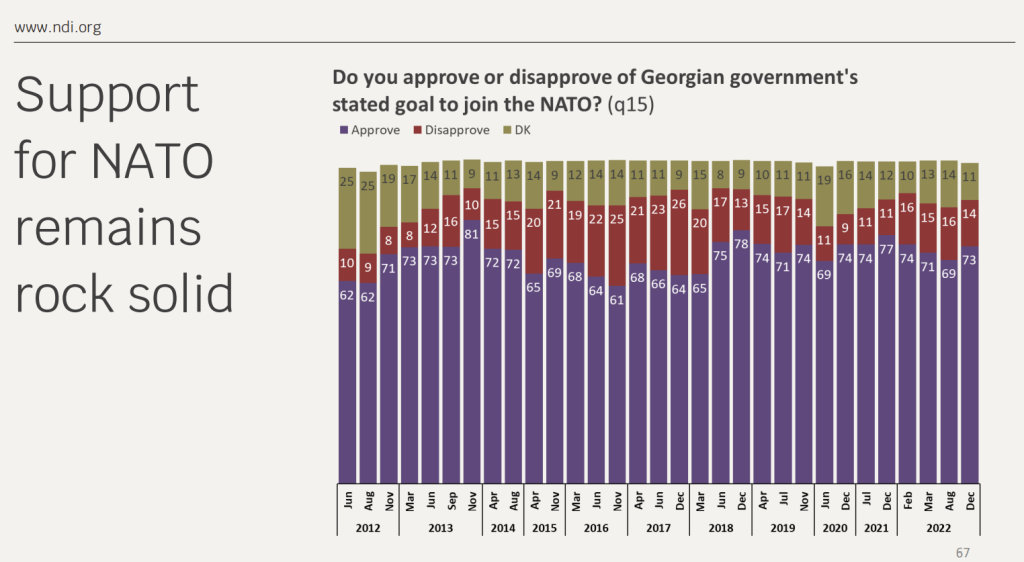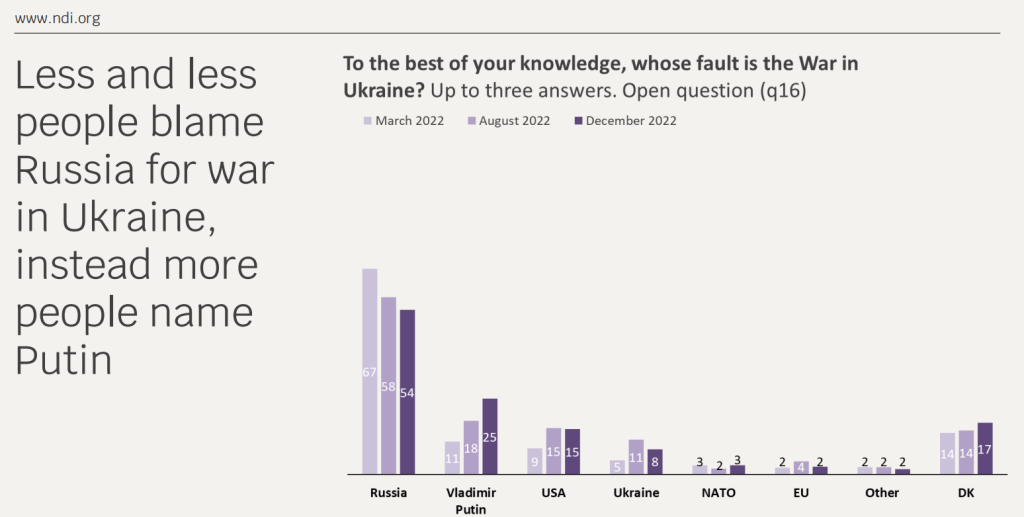
Public Attitudes in NDI Survey
The National Democratic Institute (NDI), a U.S.-founded non-profit, released a new public opinion poll on February 2, showing that support for the EU recovered to 81% after dipping to 75% in the previous August 2022 poll. 73% of Georgians continue to support NATO membership. According to the poll, public dissatisfaction with the ruling and opposition parties continued to grow. A significant dip in opposition UNM support was counterbalanced by a 10 percentage-point bump in the assessment of the government’s performance.
- 08/11/2022 – IRI Poll Shows Pessimism Among Population
- 16/09/2022 – NDI Poll Reflects EU Support, Disenchantment with Government
- 28/04/2022 – Political Ratings, Institution Rankings in IRI Poll
- 21/04/2022 – New Poll Shows Key Public Attitude Shifts Amid Ukraine War
Amid current economic challenges, the Georgian public views rising prices/inflation, unemployment, poverty, and low wages as their country’s most critical problems. Every second citizen believes that the Georgian economy is in bad shape, while the majority (51%) doubts the government’s ability to solve economic problems. One in five Georgians is considering emigrating in the coming 12 months to seek job opportunities elsewhere.

The survey was fielded by the Caucasus Resource Research Centers (CRRC) for NDI between December 3 and 20, 2022, with the financial assistance of UKAid. It was conducted through face-to-face interviews nationwide (excluding occupied territories) with 2,519 respondents. The pollsters posted an average margin of error at 1.6%.
EU, NATO integration
81% of the surveyed Georgians say they support EU membership, up from 75% reported in September 2022. Support for the EU is the lowest in the minority settlements, at the expense of high ‘don’t knows’.

30% of respondents believe that Georgia came closer to the EU over the past five years, while 29% suppose that the EU-Georgia relations have not changed. 25% think Georgia has distanced itself from the EU, while 16% do not know or refuse to answer.

Only 30% of respondents believe that the Georgian government is doing everything it can to ensure Georgia’s EU membership. 56% think the Georgian government is not doing enough and is doing nothing to achieve it, while 14% do not know or refuse to answer.
According to the poll, the public remains supportive of NATO integration and stands at 74% (up from 69% in the previous poll). Again, support for NATO is the lowest in the minority settlements, at the expense of high ‘don’t knows.’
Country direction, optimism about the future
The number of respondents who believe that Georgia is going in the right direction increased from 23% to 37%, while the number of citizens who think the country is going in the wrong direction decreased from 44% to 31%. 26% of respondents said that Georgia is not changing (29% in the previous poll). “The biggest positive shift happened among the Georgian Dream supporters,” the pollsters say.

66% of respondents noted that they feel secure in Georgia, while 34% feel insecure. “Main reasons for feeling insecure living in Georgia is related to economy,” according to the poll. 39% of those respondents who said they feel insecure named poverty; 35% named inflation and high prices; 34% – unemployment and lack of jobs; 33% – crime; 21% – political instability; 10% – high prices of drugs; 7% – poor healthcare; 6% – low level of education; 6% – territorial integrity; 5% – war in Ukraine; 4% foreigners migrating to Georgia; 4% – actions by Russia towards Georgia; 14% – other reasons.
While many people feel safe in Georgia, almost a quarter feels insecure in public places – a figure that jumps to almost half in Tbilisi. Notably, almost half of Tbilisi women feel insecure.

Most respondents (44%) are still optimistic about the future of Georgia, but less so than four years ago. 37% of respondents are neutral, 17% do not agree, and 2% have no answer or refused to answer.
State of the Georgian economy
Compared to the September poll, negative assessment of the Georgian economy dropped from 55% to 48%; the number of those respondents who evaluated the Georgian economy as average increased from 38% to 44%. The number of citizens who believe the Georgian economy is in good shape increased from 4% to 6%. Tbilisi residents, opposition supporters, and undecided remain most critical of the state of the economy.
Unemployment (58%), rising prices and inflation (55% – one in five Georgian households struggle to buy food), low wages (40%), poverty (27%), high taxes (26%), depreciation of GEL (20%), high fuel prices (13%) are perceived as main economic problems.
51% of respondents are not confident that the Georgian government can solve economic problems; 37% are confident, and 12% do not know.
According to the poll, one in five adult Georgians is unemployed and thinks of emigrating. 49% of the unemployed respondents noted that they are looking for a job but cannot find one; 20% said that they could not find a job with a suitable salary; 16% are not interested in a job; 8% are interested in a job, but currently are not looking for it; 5% are looking for a job but cannot find one with suitable working conditions; 3% do not know.
Government performance, trust in politicians, assessment of political parties
Government job approval increased by 10 percentage points compared to the previous poll. The number of those respondents who assess the government’s performance as good increased from 41% to 51%. The number of those who assess the government’s performance as bad decreased from 51% to 39%. “Government job approval increased the most amongst undecided, small city and rural residents, as well as middle age group.”
14% of respondents rate the President’s performance as good, and 32% as negative. The Prime Minister’s performance is rated as “good” by 31% and bad by 27%; the Parliament’s performance has 12% positive and 31% negative ratings.

Compared to the previous poll, more people (61%) say that none of the Georgian parties represent their interests. 31% believe that there is a party that represents their interests. 3% do not know or refuse to answer. Of that 31%, 39% of respondents can not name a party closest to them. 25% name the Georgian Dream, 6% – the United National Movement, and 13% – other parties.
War in Ukraine and Russia
The poll also covers Russia’s invasion of Ukraine. Georgians still overwhelmingly blame Russia, but the share of those who choose to differentiate Putin from Russia and blame him, grew from 18% in August, to 25% in December.

69% of respondents believe that Russian immigration might hurt Georgia; 17% say that it will have a positive impact; 6% think that it will have no impact, while 8% do not know.
57% of respondents disapprove of state policies regarding Russian immigration to Georgia; 29% approve and 14% do not know or refuse to answer. The polled respondents overwhelmingly (69%) support introducing a visa for Russian citizens; 21% are against it.
This post is also available in: ქართული Русский